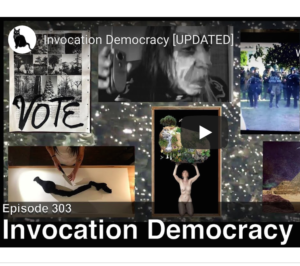
The Democratic Muse: Invoking the Future, Critics At Large, Donald Brackett

A performance, video and photographic artist working on both sides of the camera in wryly humorous, semi-autobiographical, feminist pieces.
by Monet Clark
by Monet Clark
by Monet Clark

Art provides us with a liminal space wherein momentary suspensions from our patterned thoughts and identities can be experienced, allowing for us to align with new states of awareness. Art can reveal cultural biases and their impacts, function as a catalyst for change, and it builds culture. As we nationally and globally navigate through this time of political, social, environmental and health crises the voice of the artist is needed now more than ever. With a nod to Holistic Theory and Intersectional Feminism or what I like to refer to as Holistic Intersectionality, and through the synergy of the sum of its parts, INVOCATION DEMOCRACY provides a virtual space to reflect on and envision the preservation and repair of our democracy. Joining together painters, performance, video, interdisciplinary and recording artists from across the nation, INVOCATION DEMOCRACY provides an interstice for grief, a necessary step for action, and suggests that all of our intentions, actions and our votes matter, especially during this time of transitioning power structures.
INVOCATION DEMOCRACY proposes that a healthy democracy protects not only all of the people within its borders, but also the land within its boundaries, through policies which promote proper land stewardship and management, which includes protections of animals with respect to local and global ecosystems. It maintains that healthy regional democracies engage in practices which contribute healthfully to the global climate both socially, politically and environmentally. It explores the links between Climate Change and misogyny, empire, white supremacy and cultural biases that are dismissive of indigenous perspectives globally, the mystic, the intuitive, the feminine, and the sentience of animals and nature. INVOCATION DEMOCRACY contemplates the impacts of all of these on our ailing democracy, and just what it may take to transform it. — Monet Clark, curator